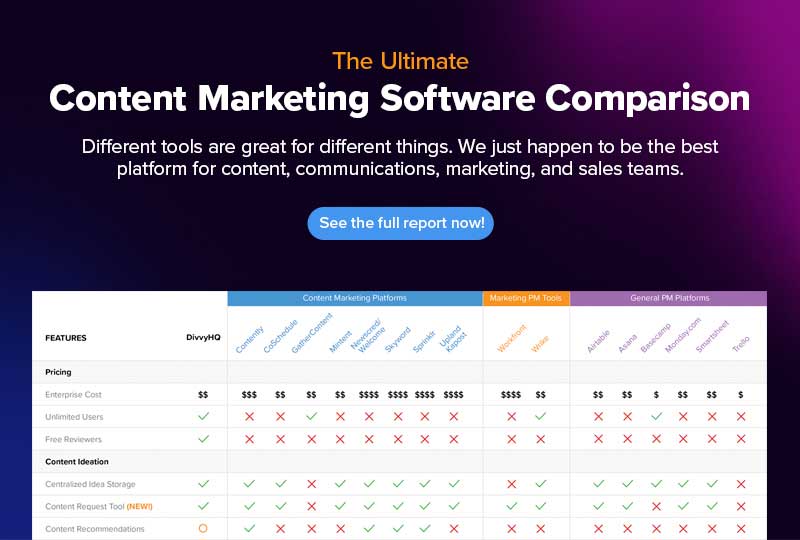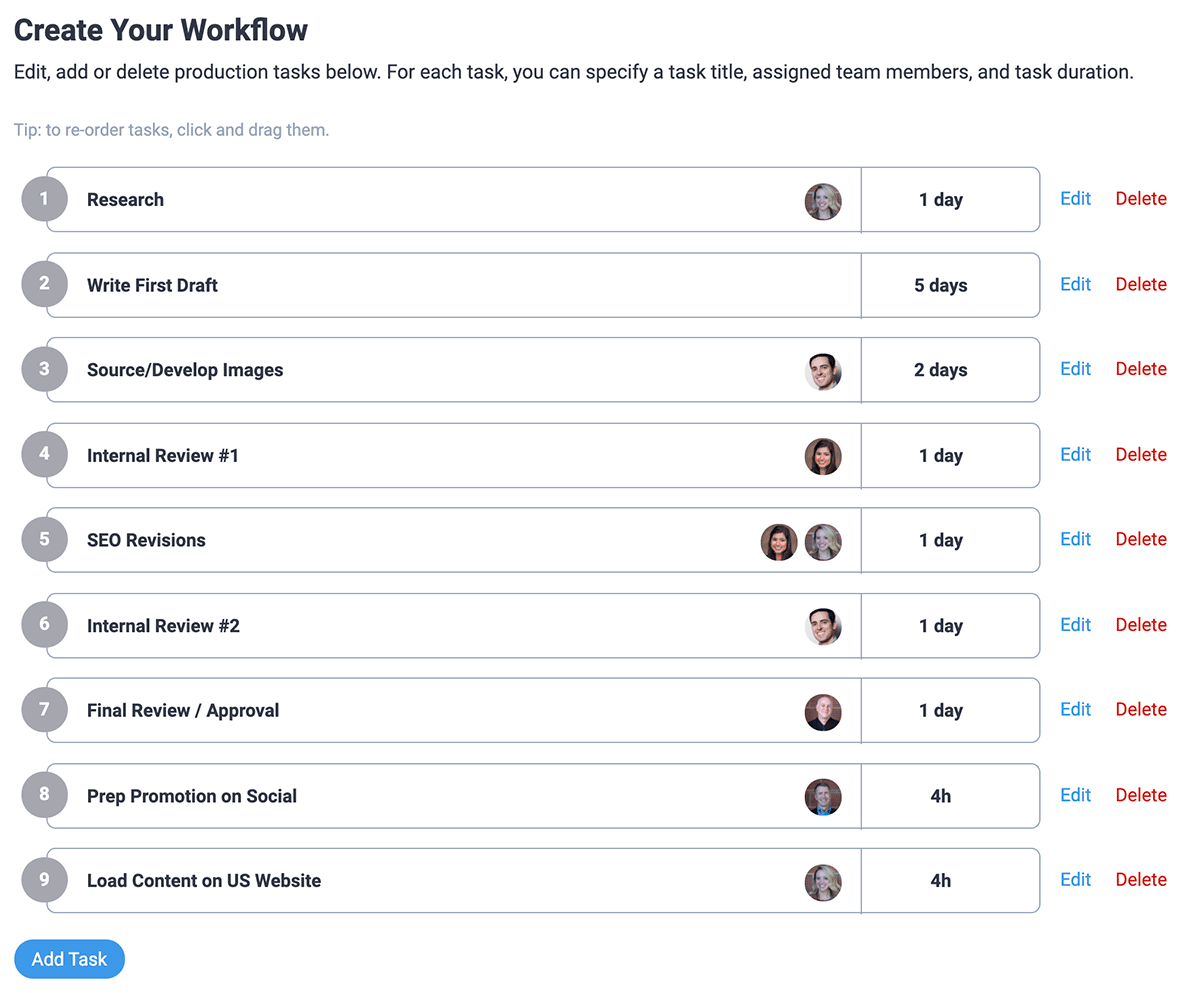DivvyHQ vs. Airtable: How Do They Stack Up?
Content marketers have come to rely on technology to streamline processes and ensure consistency. Content teams have many options for platforms. To make the best decision for your company, you should compare features. In this post, part of a competitive analysis series, we’re evaluating DivvyHQ vs. Airtable.
In the comparison, we’ll look at multiple categories, including:
- Pricing
- Content ideation features
- Content and editorial planning capabilities
- Workflow and collaboration offerings
- Content production and asset storage features
- Publishing functions and integrations
- Content and team performance analytics
- Service and support
- Setup and implementation requirements
- Security
- Other factors
Comparison Methodology
How did we complete the comparison of DivvyHQ vs. Airtable? Our staff dug into various resources, including company websites, free trials, knowledge bases, review sites, and additional sources. The full report and methodology is available here: Content Marketing Platforms: DivvyHQ vs. the Alternatives.
In deciding what features to spotlight, we included the tools and features that content, marketing and communications teams need to do their job. Consider the criteria to be similar to those used by analyst firms Gartner and Forrester for the annual reports they publish on content marketing platforms (CMPs).
While we did our best to gather all available information, but we certainly may have missed something. Not all platforms provide all details to the public.
If you’re a staff member of Airtable, and you see something we got wrong, leave us a comment. We’ll fix it.
Now that we’ve defined the how, let’s get started.
Enterprise Pricing
The cost of software certainly impacts which solution you choose. First, it’s important to note that Airtable is essentially an application that allows you to create very fancy spreadsheets with a database behind the scenes. It can be used to manage any number of general use cases, and certainly companies can use it as a general project management (PM) platform.
Between having to compete with the likes of Google Sheets (free-ish), and other low-cost platforms in the project management industry, Airtable likely has to keep their pricing very low to maintain competitiveness.
Airtable’s pricing structure is per user. The larger your team, the more you’ll pay. DivvyHQ has a similar per-seat option, but we offer unlimited user plans for larger teams. Also, there’s no cost for reviewers with read-only access, which gives them the freedom to look at current campaigns and content projects.
In summary, Airtable is likely cheaper in many situations, but their generic functionality likely won’t be tailored enough for content teams out of the box.
Content Ideation
Ideas are the catalyst for content. Centralizing these can be cumbersome without some form of storage mechanism. DivvyHQ has a powerful hub to do just that, where you can develop those ideas into projects. You can also set up request intake forms that anyone can use to request content. Content recommendations are also available.
Airtable can be configured to offer a centralized idea repository and can integrate with request forms. However, it does not have content recommendations.
Content and Editorial Planning Capabilities
These features are important for content marketers, as they provide seamless workflows for content and editorial planning. The most foundational is the content calendar.
Both Airtable and Divvy include dynamic content calendars. The Airtable calendar has limitations on architecture. Divvy’s content calendar has a flexible architecture that allows for the creation of different calendars per content channel, brands, departments, locations, or a variety of other segments. In each system, you may drag and drop entries (i.e., projects, tasks, etc.).
More calendar features shared by both platforms include:
- Shareable views for non-users
- Project and task prioritization
- Duplication of projects
- Multiple views (list, calendar, etc.)
- Color-coding
Calendar features for DivvyHQ only:
- Robust filtering of the calendar
- Content strategy metadata filtering and reporting
- Creating custom views based on unique filter queries
Both platforms have campaign planning and management. Neither have resource management functionality, which allows users to manage workloads.
Workflow and Collaboration Offerings
Technology is critical to help teams manage content workflows and collaboration. With these features, you can be more efficient, eliminating manual work. In this category, the applications share these offerings:
- Manage tasks
- Comment with @mentions in content projects to notify other collaborators
DivvyHQ offers many more features for teams in this category, including a custom workflow builder, automated workflow scheduling, reminders, and real-time browser notifications.
DivvyHQ Workflow Builder (example)
Content Production and Asset Storage Features
The features in this category relate to how you produce content and store assets. As DivvyHQ is a content marketing platform, it provides many unique tools. These include:
- HTML content editor
- Social post editor
- Tracking changes and version history
- Storage for content and assets with no limitations
- Content archive and auditing
- Asset library
Airtable only has features for an asset library and storage for uploading files, which is unlimited.
Publishing Functions and Integrations
Integrating software solutions has many benefits and is a must for most enterprise teams.
DivvyHQ Integrations
- WordPress
- Zapier
- Google Drive
- Dropbox
- Microsoft OneDrive
- SharePoint
- Box
- EPiServer
- Kentico
- Microsoft Outlook calendar
- Google calendar
- iCal
Airtable integrates with all these platforms except for WordPress, Microsoft OneDrive, SharePoint, and EPiServer. Both platforms have an open API.
Content and Team Performance Analytics
Content analytics are integral to succeeding in content marketing. Many times, it’s hard to aggregate data from various sources, making it difficult to have a 360-degree view of performance. DivvyHQ makes this a priority, gathering data from many areas to streamline analysis and insight.
The software allows you to assess performance with time tracking and reports for on-time completion and content strategy alignment.
Airtable only provides reporting on time tracking, but has no content analytics capabilities.
Service and Support
Another critical aspect of software is the service and support you receive. After deployment, your team should have peace of mind that someone will answer the phone if support is needed. DivvyHQ is very supportive of its users. They receive live onboarding and a dedicated support team. We’ll also perform a review of your platform usage, content strategy with recommendations and an analytics assessment. Users can get on-demand online support chat.
Airtable also includes live onboarding, a dedicated support team, and online support chat.
Setup and Implementation Ease
Ease of setup and implementation can ensure quick adoption. DivvyHQ is configurable in less than four hours with no need for any programming support. Airtable setup is more complex, and depending on your technical prowess, you will likely need some programming assistance.
Security
Every company has concerns about the security of the applications it uses. Both software platforms include:
- Robust user permissions and roles
- SSO (single sign-on)
- Two-factor authentication
Everything Else
Both solutions are mobile-friendly and don’t require an implementation administrator or full-time employee to manage.
DivvyHQ vs. Airtable: What’s Right for You?
While Airtable has many great features, the design is not tailored for the nuances and complexities of content marketing. DivvyHQ is, so its features correspond directly with how content teams work. If you’d like to experience it for yourself, try it out for free today.





